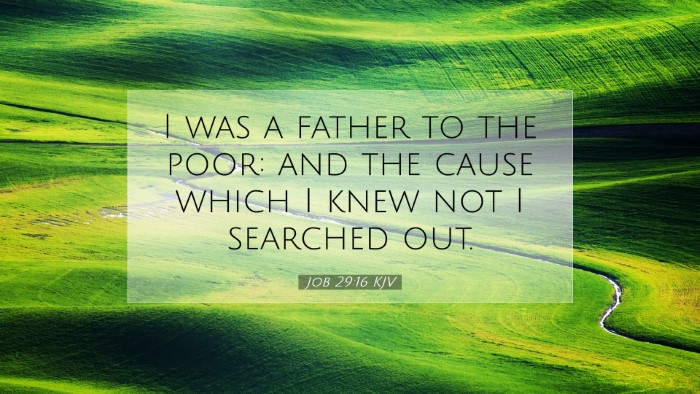Old Testament
Genesis Exodus Leviticus Numbers Deuteronomy Joshua Judges Ruth 1 Samuel 2 Samuel 1 Kings 2 Kings 1 Chronicles 2 Chronicles Ezra Nehemiah Esther Job Psalms Proverbs Ecclesiastes Song of Solomon Isaiah Jeremiah Lamentations Ezekiel Daniel Hosea Joel Amos Obadiah Jonah Micah Nahum Habakkuk Zephaniah Haggai Zechariah MalachiJob 29:16
Job 29:16 KJV
I was a father to the poor: and the cause which I knew not I searched out.
Job 29:16 Bible Commentary
Commentary on Job 29:16
Job 29:16 states: "I was a father to the poor: and the cause which I knew not I searched out." This verse encapsulates Job's integrity and character during his prosperous days. It provides profound insights that are valuable for pastors, theologians, and scholars in understanding the broader narrative of Job and the theological implications of his suffering.
Contextual Overview
Before delving into the commentary, it is essential to recognize the context of the Book of Job. The narrative is structured around Job's trials and his discussions with friends regarding suffering and divine justice. This specific verse comes from a section where Job reminisces about his past, illustrating the depth of his righteous life before his afflictions.
Insights from Commentators
Matthew Henry's Commentary
Matthew Henry emphasizes the role of Job as a paternal figure to the needy. He notes that Job not only provided for the poor materially but also took an active role in advocating for those who could not defend themselves. Job's life exemplifies the biblical principle of caring for the disadvantaged, demonstrating a heart that aligns with God’s commands.
Henry further highlights Job's commitment to justice, suggesting that he was not merely a benefactor but also an activist seeking righteousness. "The cause which I knew not I searched out," indicates Job's diligence in pursuing truth and justice, showcasing his character as one deeply concerned with moral integrity.
Albert Barnes' Notes
Albert Barnes focuses on the implications of Job's past actions. He elucidates the idea that true piety often requires action—an active involvement in the welfare of others. Job's approach to the marginalized reflects a profound understanding of his social responsibility.
Barnes also interprets "the cause which I knew not" as an acknowledgment that Job was aware of the limits of his knowledge but was nevertheless committed to seeking out the truth in any situation. This represents a humility that recognizes the complexities of human circumstances and a desire to act righteously on behalf of others, despite not having complete understanding.
Adam Clarke's Commentary
Adam Clarke offers a vivid description of Job's benevolent actions, considering them not just as charitable acts but as expressions of a deep-seated conviction about justice and equity. Clarke suggests that Job saw his wealth as a means to promote justice, aiding the poor, which is a calling grounded in biblical teaching.
Clarke interprets Job’s role as a father to the poor, indicating that Job provided emotional support, guidance, and leadership. This relational dynamic draws attention to the responsibilities of the affluent towards the less fortunate. Clarke highlights the importance of visible compassion and the obligation to enrich others’ lives through direct involvement.
Theological Reflections
This verse provides a rich ground for theological reflection, particularly in its implications for Christian ethics and social justice. The image of Job as a caregiver aligns closely with the teachings of Jesus, who emphasized caring for the poor and marginalized.
- Advocacy for the Vulnerable: As Job was a voice for the voiceless, so too are believers called to advocate for justice, reinforcing the notion that faith should manifest in action.
- The Pursuit of Truth: Job’s willingness to seek out the "cause" reflects a commitment to truth—which is a central theme throughout scripture. Engaging with difficult issues demands perseverance and integrity.
- Understanding Suffering: Reflecting on Job’s life encourages believers to consider how suffering can impact their ability to serve others. Job’s life prior to his trials reminds us that positions of influence should be used to uplift others.
Practical Applications
For pastors and church leaders, Job 29:16 calls for action-oriented ministry focused on supporting the community’s marginalized populations. It invites congregations to reflect on their roles in social justice, directing resources effectively towards those in need.
Students and theologians can examine Job's introspection and humility as models for approaching ethical dilemmas. Acknowledging the limits of one's understanding is foundational for effective leadership and ministry. This humility fosters a deeper relationship with God and a greater compassion for others.
Conclusion
In conclusion, Job 29:16 serves as a powerful testament to the integrity, compassion, and moral courage of a righteous person. By reflecting on the insights from Henry, Barnes, and Clarke, readers are encouraged to embody the principles Job lived out—a commitment to justice, advocacy for the needy, and an unyielding pursuit of truth.


